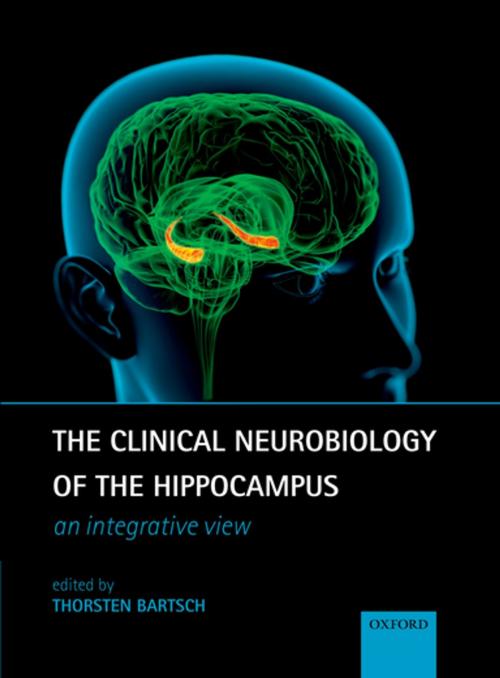The Clinical Neurobiology of the Hippocampus
An integrative view
Nonfiction, Health & Well Being, Medical, Specialties, Internal Medicine, Neuroscience, Science & Nature, Science| Author: | ISBN: | 9780191628962 | |
| Publisher: | OUP Oxford | Publication: | July 26, 2012 |
| Imprint: | OUP Oxford | Language: | English |
| Author: | |
| ISBN: | 9780191628962 |
| Publisher: | OUP Oxford |
| Publication: | July 26, 2012 |
| Imprint: | OUP Oxford |
| Language: | English |
The hippocampus is one of the most studied structures in the human brain and plays a pivotal role in human memory function. Its recognized function is reflected by the presence of an extensive body of neurophysiological, neuropsychological, anatomical and neurocomputational literature that presents basic mechanisms, theoretical models and psychological concepts. However, in the rapidly growing field of hippocampal research, the clinical aspects of diseases that affect the hippocampus are greatly under-represented in current literature, and clinical approaches and concepts are scattered throughout various clinical and basic scientific disciplines. The Clinical Neurobiology of the Hippocampus explores clinical approaches to the range of diseases that affect the hippocampus. It brings together and reviews the common methods, clinical findings, concepts, mechanisms and, where applicable, therapeutic strategies for these clinical approaches. The clinical spectrum of hippocampal dysfunction encompasses a wide range of neurological, behavioural and psychiatric symptoms and surpasses the ability to encode, store and retrieve information. The relevance of hippocampal involvement in clinical diseases goes beyond mere neuropsychological deficits and includes psychopathological states in various conditions, such as acute amnesic syndromes, Alzheimer's disease, temporal lobe epilepsy (TLE), sleep, stroke medicine, limbic encephalitis, neurodevelopmental disorders, stress- and trauma-related disorders, depression, and schizophrenia. The first part of the book covers the basic and integrative features of the hippocampus, such as the anatomy and imaging of this structure, and the basic mechanisms of hippocampal function, including the principles of hippocampus-dependent memory processing in amnesia and sleep, the mechanisms of vulnerability and adult neurogenesis as well as the effects of stress. The second part covers the various clinical manifestations in which the hippocampus is involved and in which the preceding basic mechanisms are reflected. Bringing together a broad team of experts on the basic and clinical aspects of the hippocampus, the book provides an integrative view of the hippocampus. It is invaluable for neurologists, neuroscientists, and psychiatrists, and will stimulate interdisciplinary discussions in clinical neuroscience.
The hippocampus is one of the most studied structures in the human brain and plays a pivotal role in human memory function. Its recognized function is reflected by the presence of an extensive body of neurophysiological, neuropsychological, anatomical and neurocomputational literature that presents basic mechanisms, theoretical models and psychological concepts. However, in the rapidly growing field of hippocampal research, the clinical aspects of diseases that affect the hippocampus are greatly under-represented in current literature, and clinical approaches and concepts are scattered throughout various clinical and basic scientific disciplines. The Clinical Neurobiology of the Hippocampus explores clinical approaches to the range of diseases that affect the hippocampus. It brings together and reviews the common methods, clinical findings, concepts, mechanisms and, where applicable, therapeutic strategies for these clinical approaches. The clinical spectrum of hippocampal dysfunction encompasses a wide range of neurological, behavioural and psychiatric symptoms and surpasses the ability to encode, store and retrieve information. The relevance of hippocampal involvement in clinical diseases goes beyond mere neuropsychological deficits and includes psychopathological states in various conditions, such as acute amnesic syndromes, Alzheimer's disease, temporal lobe epilepsy (TLE), sleep, stroke medicine, limbic encephalitis, neurodevelopmental disorders, stress- and trauma-related disorders, depression, and schizophrenia. The first part of the book covers the basic and integrative features of the hippocampus, such as the anatomy and imaging of this structure, and the basic mechanisms of hippocampal function, including the principles of hippocampus-dependent memory processing in amnesia and sleep, the mechanisms of vulnerability and adult neurogenesis as well as the effects of stress. The second part covers the various clinical manifestations in which the hippocampus is involved and in which the preceding basic mechanisms are reflected. Bringing together a broad team of experts on the basic and clinical aspects of the hippocampus, the book provides an integrative view of the hippocampus. It is invaluable for neurologists, neuroscientists, and psychiatrists, and will stimulate interdisciplinary discussions in clinical neuroscience.















